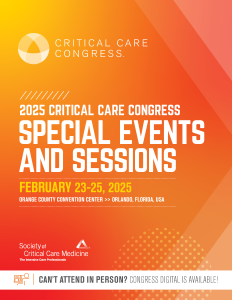Professional Development & Education
Research Snapshot Theater: Professional Development and Education, Adult I
(1076) Critical Care and Emergency Medicine Pharmacy Practice: A Curriculum for Student Pharmacists
Monday, February 24, 2025
10:15am - 11:15am Eastern Time
Location: Connections Central - RST 16

Angela Slampak-Cindric, BCCCP, BCPS, PharmD (she/her/hers)
Geisinger Medical Center
Danville, Pennsylvania, USA
First Author(s)
Introduction: Critically ill patients have complex medication needs. Critical care pharmacists play an essential role in highly functioning multiprofessional teams providing optimal care. Including pharmacists on the team has been shown to improve mortality, decrease length of stay, and prevent adverse medication events. Specialized knowledge is required for pharmacists to provide care including critical disease state management, ensuring medication safety and efficacy, emergency bedside response, patient and provider education, and research and scholarship. Postgraduate pharmacy residency is the preferred post-doctoral pathway to attain the requisite knowledge and skills. Student pharmacists are called to decide postgraduate pathways in the fourth professional year. Pathways may include residency training, industry fellowship, or employment without postgraduate training. Formative didactic and experiential learning activities may drive career path selection. Pharmacy institutions without early opportunities to explore care of critically ill patients may matriculate less graduates who pursue the training needed to care for this population.
Methods: A virtual interactive curriculum with simulation based experiential opportunities for student pharmacists was created. This curriculum utilizes a contemporary blend of virtual didactic instruction, role play, problem-based learning, think pair share, social media infographic genesis, simulation, and artificial intelligence to empower and excite student pharmacists to care for critically ill patients.
Results: The curriculum was adopted, and enrollment began in the 2022 academic year. The course filled to capacity. Following positive outcomes from the inaugural cohort, the course was renewed for the 2023 and 2024 academic years and continues to enroll learners to capacity. Curriculum graduates surveyed report that the course was pivotal in influencing their career trajectory, with more aspiring to post graduate residency training to care for critically ill patients as well as fueling their interest in inpatient pharmacy practice.
Conclusions: An innovative, virtual curriculum providing early experience in the care of critically and emergently ill patients inspires student pharmacists to pursue post graduate training in the critical care specialty.
Methods: A virtual interactive curriculum with simulation based experiential opportunities for student pharmacists was created. This curriculum utilizes a contemporary blend of virtual didactic instruction, role play, problem-based learning, think pair share, social media infographic genesis, simulation, and artificial intelligence to empower and excite student pharmacists to care for critically ill patients.
Results: The curriculum was adopted, and enrollment began in the 2022 academic year. The course filled to capacity. Following positive outcomes from the inaugural cohort, the course was renewed for the 2023 and 2024 academic years and continues to enroll learners to capacity. Curriculum graduates surveyed report that the course was pivotal in influencing their career trajectory, with more aspiring to post graduate residency training to care for critically ill patients as well as fueling their interest in inpatient pharmacy practice.
Conclusions: An innovative, virtual curriculum providing early experience in the care of critically and emergently ill patients inspires student pharmacists to pursue post graduate training in the critical care specialty.

